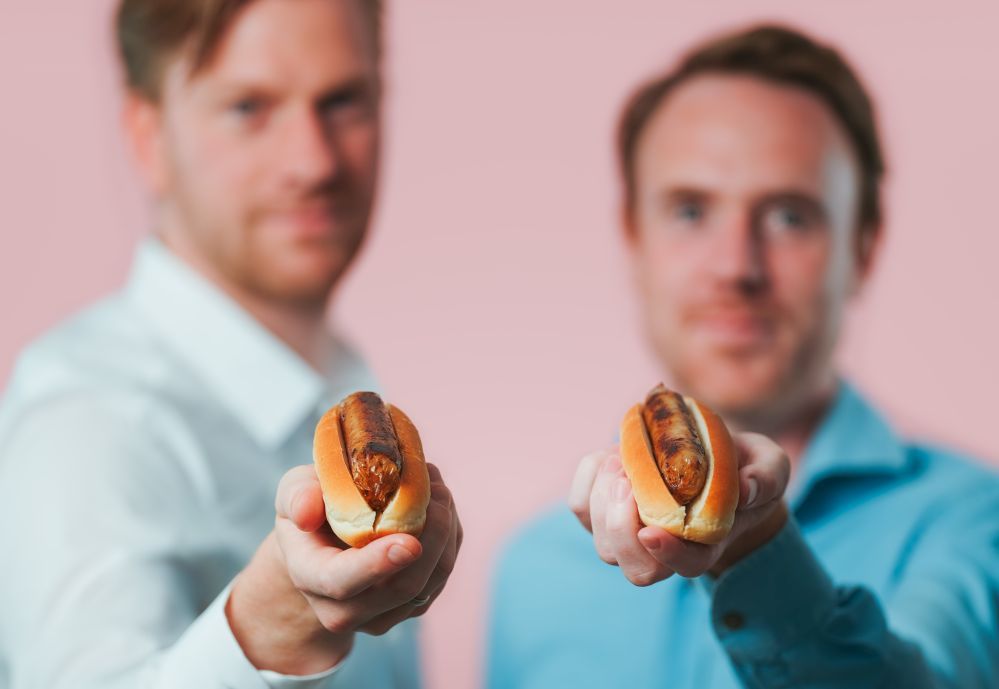- Dutch cultivated meat startup Meatable has raised $35 million in a series B round led by Agronomics, taking its total funding to $95 million as it gears up to launch pork sausages and dumplings in Singapore next year.
- The round includes $17 million from Dutch impact fund Invest-NL, a new investor, and drew renewed support from existing investors including BlueYard, Bridford Group, Milky Way Ventures, DSM Venturing and Taavet Hinrikus (chairman and founder of cross-border payments firm Wise).
- The capital injection represents a “huge sign of confidence in the incredible quality, taste, and proven scalability of our product, especially in the current investment climate,” claimed the company.
- Founded by Daan Luining, Krijn de Nood, and Dr. Mark Kotter in 2018, Meatable now has a team of 100.

‘There’s no doubt that it’s been more challenging to raise capital in the current climate’
One of the best-funded players in the cultivated meat space, Meatable has a pilot facility in Delft and hopes to launch at a small scale in Singapore in 2024 and in the US in 2025 with hybrid products containing a mix of cultivated- and plant-based meat.
Cofounder and CEO Krijn de Nood told AgFunderNews: “There’s no doubt that it’s been more challenging to raise capital in the current climate. We are however thrilled to bring on a strong new investor and are proud of the continued confidence our existing investors have in us. This new funding allows us to continue to work towards our vision and take the next steps to scale up further and accelerate commercial launch.”
Meatable hosted tastings in Singapore earlier this year following approval from the Singapore Food Agency and is producing products there with contract manufacturer Esco Aster, which also works with GOOD Meat. It is now co-developing its product range with plant-based butcher Love Handle, said de Nood.
“Starting in Singapore, we are working towards having our products, including sausages and pork dumplings, available in restaurants in 2024 and available in retail in 2025. We are also in the process of establishing a presence in the United States and starting production on the ground, pending regulatory approvals and we are already in contact with the FDA and USDA on this matter.”
The funding will be “used to further scale our processes and accelerate our commercial launch,” he added. “This includes scaling Meatable’s highly efficient technology to commercial volumes and further reducing production costs to reach cost competitiveness with traditional meat.”
“We are genuinely excited about the pioneering endeavors undertaken by Meatable. Cultured meat has the potential to deliver unrivaled impact in terms of animal welfare, CO2 equivalent emission reduction, water use, land use and antibiotics abatement. The breakthroughs achieved by Meatable have convinced us that they possess the know-how and team to make this potential a reality.” Bastiaan Gielink, senior investment manager, Invest-NL
‘The fastest process in the field to produce cultivated meat’
Meatable recently revealed it had slashed production times for cultivated pork from three weeks to eight days by speeding up the process by which its stem cells differentiate into fat and muscle, transforming its unit economics, said de Nood. “We now believe we have the fastest process in the field.”
While the technology has thus far only been demonstrated in 50-liter bioreactors, Meatable is currently scaling up to 500-liter vessels and is “very confident that this process will scale,” he said.
Meatable uses pluripotent stem cells, which have certain advantages including rapid division (they can proliferate fast without being ‘immortalized’) and versatility (they can differentiate or transform into multiple different cell types such as fat or muscle).
While PSCs can be challenging to work with, Meatable deploys patented ‘opti-ox’ technology developed by cofounder Dr. Mark Kotter that makes it possible to activate transcription factors (combinations of which encode the identity of cells) with a “precision rarely seen in biology.” This enables it to both precisely control and dramatically speed up the differentiation process, explained de Nood.
“They are basically very early-stage stem cells that can become any cell type. We like them because they divide very fast and grow in aggregates. The challenge with using that cell type is that if you want a hundred cells to become muscle cells, only 30 or 40 actually do. But we have a patented technology that, in a couple of days, can steer all of the cells in the direction we want them to go.”
‘We have to be cost-competitive with traditional meat’
Speaking to us at the SynBioBeta conference in Oakland, California, in May, de Nood said: “We have to be cost-competitive with traditional meat. If we cannot do that, in the long term, we don’t have a business and we don’t have a purpose.”
He added: “The hybrid approach [combining plant-based and cell-cultured meat] makes a lot of sense for the first generation of products. Even with an inclusion rate of 10% cultivated meat [and 90% plant-based meat], we do internal tasting panels and we see it’s already much better than the plant-based product because the off-tastes go away. And 50:50 products are indistinguishable from traditional meat.
“But solid meat [thick cut steaks, for example] is something for the future because there, you actually do need fundamental breakthroughs, although we still have a small team working on that.”
As for the consumer proposition of cultivated meat, “it’s very simple,” said de Nood. “What we can offer is real meat with no compromise. And if we are able to scale it to get to cost [parity with conventional meat], I don’t see a reason why you wouldn’t buy it. You’d be crazy to say ‘I want that dead animal.’”
Watch our video with de Nood at the SynBioBeta conference in Oakland, California, in May:
Further reading:
Cultivated meat startup Higher Steaks raises $30 million series A, rebrands as ‘Uncommon’




